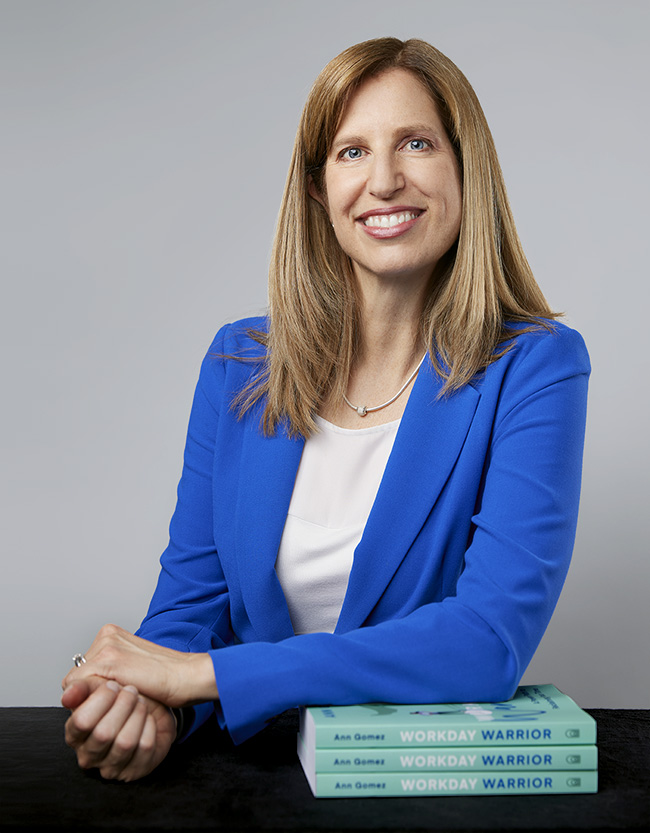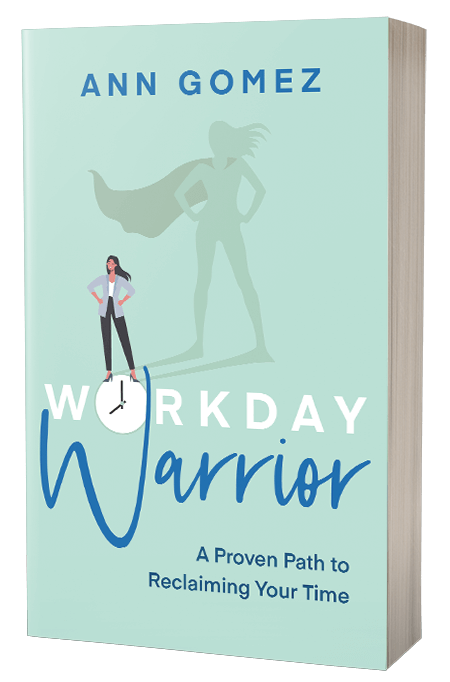Who has the time?

While working in management consulting, Ann Gomez noticed some people who handled heavy workloads and had great personal lives. They socialized! They slept! Others struggled to keep up, despite working all hours. Her realization provided newfound purpose. In 2004, she founded Clear Concept Inc., a training organization that helps people thrive at work. Last year, Gomez wrote a book called Workday Warrior: A Proven Path to Reclaiming Your Time (Dundurn Press). In conversation with contributor Rebecca Harris, she talks about barriers to productivity and how people can work smarter, not harder.
Rebecca Harris: How do you define productivity?
Ann Gomez: For me personally, productivity is about making time for what we value most. If we don’t spend enough time on what we value most, we don’t feel we’re making the most of our time.
What’s the goal of being more productive?
Productivity is all about getting the results we want. It’s not about the number of hours we log or the number of things we cross off our list. It’s not about busy work. And that’s true in both our work life and personal life. In my personal life, for example, I would like to digitize the decades of old family photos I have inherited, and I’d like to do that in a very efficient and effective way. The goal is not to spend night after night digitizing photos. The goal is to achieve a solid result: having a nicely organized collection of family photos from over the years, without this project absorbing every evening.
What stops people from being productive at work?
It comes down to three challenges. One is people try to do too much at the same time. So, they dilute their efforts, which leads to working around the clock, or the nagging feeling that they should be working around the clock. Two, people are too flexible with their time, so they’re pulled here and there and are not able to protect sufficient time for what’s most important. Three, a lot of us — me included, if I’m not careful — tend to complicate their work. When we strip away the complication and simplify, we create better results.
Flexibility is a buzzword today. What’s the case for being more structured?
I used to think flexibility was the Holy Grail. That’s why we worked so hard: to be able to take the time off that we want and decide what we want to focus on. In all those cases, flexibility is great. But, just like most things in life, too much of a good thing is a challenge. The same is true with flexibility. For example, arguably all of us could go to the gym at any time, but routines help us build a consistent fitness habit and allow us to prioritize this time.
This is equally true in our work life. You might feel you don’t get enough time for your most important goals because so many other things get in the way. And so, after studying the world’s most productive people, the solution I recommend is to pay yourself first by blocking time for your priorities before other tasks get in the way. Paying yourself first is a familiar financial concept that applies equally well to your most precious resource — your time.

What are some practical ways to carve out that time?
A lot of people have days filled with meetings, collaborative work and emails to respond to, as well as the independent, focused work that needs to get done. And most people tend to put off their focus work until all the other more reactive, responsive, collaborative work is done. But the desired “free time” never materializes. My suggestion is to protect time during our workday for our most essential work first. Block your time, which is akin to booking a meeting with ourselves. And just like when you meet with another person, minimize email and turn off your notifications. Then dive into one of your most important priorities.
Another strategy is to pair our most important work with our highest energy. For most of us, our peak is in the morning. We have a trough seven hours later and then a recovery later in the day. Night owls find their peak energy late in the afternoon, but they still have a good amount of energy at the beginning of their workday, even if their workday starts later than others. Regardless, I recommend we all start our day with focused work, to take full advantage of that healthy, robust energy. We don’t want to give away our highest energy to reactive tasks.
Should some of the onus be on employers to build a culture that enables productivity?
Absolutely. There are two strategies I recommend all leaders focus on. One, stop trying to do it all at the same time. The most effective organizations and the most effective leaders are clear on their three core priorities. And we want the same at the organization level, which trickles down to the department and individual levels. If an organization has more than three core priorities, they spread themselves thin and create chaos for their teams; they have more meetings and deadlines; they make slower progress; they feel frustrated; they end up working overtime. That is not a productive environment.
The second strategy is to support people to protect focus time. There is a ridiculous expectation in the workplace that people need to provide instant responses. We treat everything like it’s urgent. As a result, people’s attention is constantly diverted. We don’t need instantaneous responses. We need timely responses. And we need to support people to protect focused work time, which allows us to work more efficiently and with less stress.
What are the steps to being more productive?
Be clear on what your core priorities are for both your work and your personal life. In my personal life, my core priorities are self-care and family. Those get the majority of my attention. Then I allow myself one personal project, like the photo project I mentioned earlier. In my work life, it’s client work, content development and running a company.
Within your core priorities, rank the tasks on your list. We call this your MAP — Main Action Plan — which is a priority management system. That is a must-have tool for busy people. It’s a strategic system to align your work to your core priorities, corporate KPIs, deadlines, goals and commitments, and to help you stay focused on what you value most.
The second tool is your plan for how you want to protect time for those core priorities. This will provide the structure to protect time for what matters most to you before other tasks get in the way. And the third tool — and this is what the world’s most productive people do — is to constantly consider where you can scale back, streamline or seek help. That’s not about cutting corners; it’s about how to be a “multiplier” who simplifies and delegates. It’s the opposite of what a lot of people do, which is overthink and overcomplicate work. Striving for perfection is a great way to overcomplicate work, and productivity does not need to be complicated.
